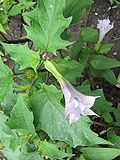Datura
Genus of poisonous plants potentially psychoactive
Pronounced da-tu' -rah, [Hind., dhatura, a certain plant], it is a genus of Solanacece, or nightshade family.
Species[edit]
- Dantura arbor ea is a South American spe- cies; the leaves are used as an emollient.
- Dantura ceratocaula is indigenous to tropical America; its properties are similar to those of D. stramonium.
- Dantura fastuosa is found through- out the tropics of the old world.
-
Datura
-
Datura metel 'Fastuosa'
-
Datura Stramonium Samenkapsel
-
Köhler Datura
-
Datura stramonium
Traditional Islamic Medicine[edit]
- The root is administered by Mohammedan physicians in epilepsy.
- The fruit, seeds, and leaves are used in poultices for boils, carbuncles, and in the treatment of herpetic diseases. A tincture and decoction are given as a remedy for asthma.
Use[edit]
The plant is poisonous and soporific, and is used in India as an intoxicant, and by professional poisoners for killing newborn female infants ( see female infaticide).
Related species[edit]
- Cf. Dhatureas. D. metel possesses qualities similar to D. fastuosa. D. sanguinea is a South American species, the floripondio of Peru, from the seeds of which an intoxicating beverage called tonga is prepared.
- Taken alone and in large doses it produces furious delirium, but diluted is a soporific.
- The seeds are used in the preparation of an ointment.
- D. stramonium is the thorn-apple. See Stramonium.
| This article is a stub. You can help WikiMD by registering to expand it. |
Ad. Transform your life with W8MD's Budget GLP-1 injections from $75


W8MD offers a medical weight loss program to lose weight in Philadelphia. Our physician-supervised medical weight loss provides:
- Weight loss injections in NYC (generic and brand names):
- Zepbound / Mounjaro, Wegovy / Ozempic, Saxenda
- Most insurances accepted or discounted self-pay rates. We will obtain insurance prior authorizations if needed.
- Generic GLP1 weight loss injections from $75 for the starting dose.
- Also offer prescription weight loss medications including Phentermine, Qsymia, Diethylpropion, Contrave etc.
NYC weight loss doctor appointmentsNYC weight loss doctor appointments
Start your NYC weight loss journey today at our NYC medical weight loss and Philadelphia medical weight loss clinics.
- Call 718-946-5500 to lose weight in NYC or for medical weight loss in Philadelphia 215-676-2334.
- Tags:NYC medical weight loss, Philadelphia lose weight Zepbound NYC, Budget GLP1 weight loss injections, Wegovy Philadelphia, Wegovy NYC, Philadelphia medical weight loss, Brookly weight loss and Wegovy NYC
|
WikiMD's Wellness Encyclopedia |
| Let Food Be Thy Medicine Medicine Thy Food - Hippocrates |
Medical Disclaimer: WikiMD is not a substitute for professional medical advice. The information on WikiMD is provided as an information resource only, may be incorrect, outdated or misleading, and is not to be used or relied on for any diagnostic or treatment purposes. Please consult your health care provider before making any healthcare decisions or for guidance about a specific medical condition. WikiMD expressly disclaims responsibility, and shall have no liability, for any damages, loss, injury, or liability whatsoever suffered as a result of your reliance on the information contained in this site. By visiting this site you agree to the foregoing terms and conditions, which may from time to time be changed or supplemented by WikiMD. If you do not agree to the foregoing terms and conditions, you should not enter or use this site. See full disclaimer.
Credits:Most images are courtesy of Wikimedia commons, and templates, categories Wikipedia, licensed under CC BY SA or similar.
Translate this page: - East Asian
中文,
日本,
한국어,
South Asian
हिन्दी,
தமிழ்,
తెలుగు,
Urdu,
ಕನ್ನಡ,
Southeast Asian
Indonesian,
Vietnamese,
Thai,
မြန်မာဘာသာ,
বাংলা
European
español,
Deutsch,
français,
Greek,
português do Brasil,
polski,
română,
русский,
Nederlands,
norsk,
svenska,
suomi,
Italian
Middle Eastern & African
عربى,
Turkish,
Persian,
Hebrew,
Afrikaans,
isiZulu,
Kiswahili,
Other
Bulgarian,
Hungarian,
Czech,
Swedish,
മലയാളം,
मराठी,
ਪੰਜਾਬੀ,
ગુજરાતી,
Portuguese,
Ukrainian




